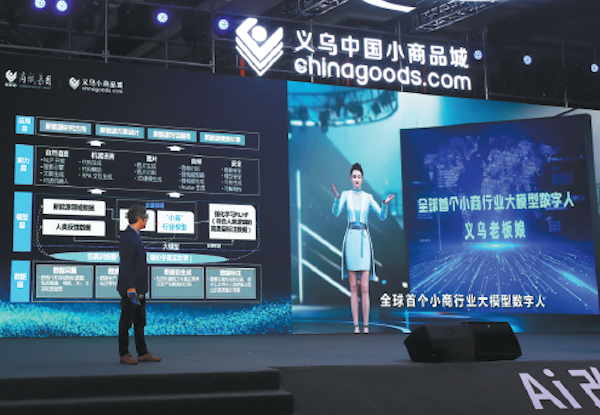AI transforms sales, eases biz practices

Yiwu launches its updated trade service platform chinagoods.com, which offers cutting-edge artificial intelligence technologies to the consumer goods market in Yiwu, Zhejiang province, in October. GONG XIANMING/FOR CHINA DAILY
Language barriers, logistics no longer burdens as tech takes over old roles
Chen Meijun, a toy saleswoman at Yiwu International Trade Market in East China's Zhejiang province, recently posted a video on an online service platform in which she became a "language expert" — speaking four foreign languages fluently while introducing products.
With the help of fast-developing artificial intelligence technology, Chen simply needs to record a video in Chinese and upload it to the internet, whereupon the video will be automatically converted into 36 different languages. The shape of the speaker's mouth can also be adjusted accordingly based on the pronunciation.
Chen said platforms for traditional Chinese foreign trade enterprises to win new customers have changed in recent years, as digitalization has become a necessary option for small and medium-sized companies to ramp up sales.
Chen said she has also opened a digital showroom to exhibit new products, and buyers can directly make purchases via online marketplaces.
"Some overseas buyers even came to Yiwu and directly sought me out after seeing my videos online," she said.
Currently, Chen's products are sold to more than 100 countries and regions around the world, including the Middle East, South America and Russia. Chen is among a growing number of entrepreneurs capitalizing on internet-based cutting-edge technologies to transform traditional foreign trade models, as well as expand their presence in emerging markets.
Experts said an increasing number of innovative digital technologies — such as virtual reality, augmented reality and AI — have been applied to online e-commerce sites, with the potential to change the way people shop by providing interactive consumer experiences and creating merchandise demonstrations and descriptions.
The impact of AR and VR in retail is proving transformative, as retailers can use these emerging modalities as an extension of brand experience to engage customers in immersive environments and boost revenues, they added.
Chinese tech heavyweight Alibaba Group's research institute Damo Academy has collaborated with the company's online licensing platform Alifish to launch an extended reality-powered marketplace on e-commerce platforms Tmall and Taobao that allows consumers to shop for commodities using customizable avatars.
Extended reality is an umbrella term for AR, VR and mixed reality technologies that merge aspects of the physical and digital worlds together to create an immersive and interactive experience.
Alibaba said consumers can browse virtual stores from over 30 internationally recognized franchises, choose their own digital avatars and place product selections in virtual shopping carts. They can also have a 360-degree view of commodities and use AR technology to virtually "try on" clothes, watches, jewelry and shoes on the platforms.
As part of its push to embrace immersive retail, Tmall has rolled out about 10,000 3D virtual "model houses" in collaboration with offline furniture retailers. The models allow online customers to place virtual furniture in their homes to see how things look without having to visit a brick-and-mortar store. Designers can customize furniture and interior decor according to customer preferences.
In addition, Alibaba's luxury shopping platform Tmall Luxury Pavilion has made available a virtual influencer named Timo. The gray-haired character is able to curate and host exhibitions on the platform, including showcases of 3D digital collectibles featuring luxury brands.
The application of AR and VR technologies in online marketplaces will not only improve buyers' remote shopping experiences and promote consumption recovery, but also spearhead a new shopping trend, said Yu Jianing, executive director of the metaverse industry committee at the Beijing-based China Mobile Communications Association.
"Innovative digital technologies are playing an increasingly vital role in empowering the real economy and promoting deeper integration of the digital world with the real world, while offering an immersive and interactive experience that makes shopping more convenient," Yu said.
Chinese e-commerce platform JD has teamed up with world-renowned luxury brands to enable customers to view product details via 3D visualization, offering virtual trying-on experiences via AR technology.
It also unveiled AR/VR makeup features to help customers test multiple cosmetic products on their faces with virtual makeup results before hitting the purchase button. Consumers can virtually try on products including lipstick, blush, colored contact lenses and eyebrow pencils.
JD said it hopes to give tech-savvy customers the interactive experiences they get in offline stores via VR/AR technologies, while offering them the convenience of having their favorite products just clicks away from arriving at their doorstep.
Hong Yong, an associate research fellow at the Chinese Academy of International Trade and Economic Cooperation's e-commerce research institute, said AR and VR technologies are becoming important driving forces for the high-quality development of e-commerce. They will also help unleash the potential of consumption and bolster industrial upgrades.
According to a report released by market consultancy International Data Corp, the investment scale of the global AR and VR market is expected to increase to $74.73 billion in 2026, with a compound annual growth rate of 38.5 percent. Specifically, the CAGR of the Chinese AR/VR market is expected to reach 43.8 percent during this period, ranking top globally.
Jennifer Ye, PwC consumer markets leader for the Chinese mainland, said as technological advances gather pace, merchants should be prepared for rapid transformation — including upgrading both online and offline shopping contact points — to stay relevant to consumers.
Companies should take advantage of creative opportunities posed by various high-potential and malleable technologies, including AR and VR, Ye said.
"Retailers should look to enrich the customer experience through the development of online communities in the metaverse, where VR avatars can come together and discuss shared interests," she added.
Moreover, AI-powered virtual hosts that bear a close resemblance to real humans in appearance and behavior have increasingly been utilized in livestreaming e-commerce. These virtual hosts can mimic human facial expressions and movements, and interact naturally with consumers while answering their queries promptly.
Chinese tech giant Baidu Inc has released its digital avatar platform Xiling, which provides a complete set of services for the creation and operation of virtual hosts, virtual celebrities and virtual brand spokespersons in fields including retail, broadcasting, television and finance, enabling more industries to use virtual humans.
In a test, a virtual livestreamer created by Xiling sold smart watches for 33 hours, generating 13,000 yuan ($1,801) in sales. Virtual hosts can change makeup and clothing at the user's request to improve the shopping experience of the latter.
Li Shiyan, head of Baidu's digital human and robotics business department, said more and more brands are looking to use virtual hosts in livestreaming and other marketing campaigns, which will help enterprises reduce at least 50 percent of operational costs by cutting spending on brick-and-mortar livestreaming locations, hardware and hiring human anchors.
The development of the virtual human sector is still in its initial stages and there exist some challenges, such as how to affordably produce digital assets and digital content, and how to make digital humans interact with real people more naturally, Li said.
The size of China's virtual human market is expected to reach 270 billion yuan by 2030, according to an industry report released by Qbit-AI, an industry services platform focusing on AI and other cutting-edge technologies.
The use of AI-powered virtual hosts in e-commerce livestreaming sessions can bring a feeling of freshness to users, while brand owners can attract new consumers via this innovative method, said Mo Daiqing, a senior analyst at the Internet Economy Institute, a domestic consultancy.
Virtual livestreamers can play an important role in finishing tedious and repetitive tasks, enhancing the shopping experience and boosting product sales, thus allowing human hosts to devote more time to creative work, Mo said.
However, they will not totally replace real human hosts, as it is difficult for virtual anchors to fully establish trust with fans, Mo added.
Technology is playing an even more central role in the sales process, and chief sales officers need to get ahead of a series of innovations that will significantly disrupt sales strategies and pricing methodologies, said Noah Elkin, vice-president and team manager at market research company Gartner's sales practice.
Elkin said businesses are already seeing the impact of AI in many of the tech solutions they use, but generative AI in particular will be a breakthrough that will help scale sales content and engagement.
"The digital human economy is going to revolutionize the composition of traditional sales teams and grow to become a market worth hundreds of billions of dollars," he said.
Gartner added that the AR/VR experience, in particular, will be integral as the metaverse ramps up, and business-to-business buying and selling becomes almost exclusively digital. In the next five years, AR/VR could become a critical sales channel for sales meetings, product demonstrations and marketing training.

A foreign buyer checks out products at the Yiwu International Trade Market in February. SHI KUANBING/FOR CHINA DAILY





 play
play